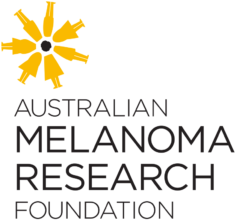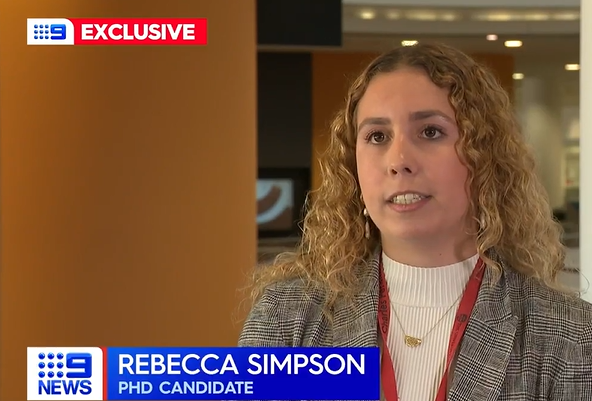2021 Research Grants
The AMRF has awarded the 2021 research projects. Quality applications were received from around the country to make a very competitive field.
Thanks to our generous donors throughout the year, we are once again thrilled to announce our research grants for 2021.
In line with our vision going forward, these grants continue the work in different areas of research which investigate the many different pathways that will ultimately change outcomes for people diagnosed with melanoma, and to improve the current alarming statistics.
It is only with the support of our melanoma community, AMRF team and board that we can strive to achieve the best outcome now and for future generations.
We wish to acknowledge the incredible support given by donors, volunteers and fundraisers Australia wide. Thank you.
Postgraduate
Research into the role of the gut microbiome during immunotherapy
Rebecca Simpson, PhD Candidate
Melanoma Institute Australia, Charles Perkins Centre, University of Sydney
Early Career Researcher
Novel targets for melanoma immunotherapy
Dr Pouya Faridi
Monash University, Melbourne
Research into the role of the gut microbiome during immunotherapy
Rebecca Simpson
PhD Candidate, Melanoma Institute Australia, Charles Perkins Centre, University of Sydney
The microbes in our gut (microbiome) influence immune processes throughout the body. This includes how patients respond to immunotherapies. These therapies aim to reactivate a patient’s own immune system to recognise and kill tumour cells. However, still, nearly 50% of patients with advanced melanoma die due to resistance. Furthermore, concurrent inflammatory side effects frequently cause severe morbidities, sometimes resulting in patients having to cease therapy.
My research looks at the role of the gut microbiome during immunotherapy. Specifically, how diet and intestinal microbes influence the efficacy and safety of treatment. Since diet can alter the microbiome thereby impacting gut “leakiness” and the inflammatory state of the immune system, we therefore hypothesise that changes to diet could beneficially alter the microbiome to improve both the effectiveness and safety of therapy.
With the support of the AMRF we will utilise a mouse model to test whether dietary changes are able to beneficially alter the microbiome and lead to favourable immune changes during immunotherapy. Understanding the interactions between diet, the microbiome and the immune system will inform the feasibility and design of dietary interventions in the clinic.

Rebecca Simpson
June 2022 update
Rebecca Simpson has the following update to share with us.
My research looks at the role of the gut microbiome during immunotherapy. Specifically, how diet and intestinal microbes influence the efficacy and safety of treatment. The AMRF has supported an animal study designed to complement the existing and on-going clinical investigation in metastatic melanoma patients, involving the analysis of microbiome sequencing data as well as matched immune profiles, metabolites and nutritional patterns. This work involved using a mouse model to test whether dietary changes can beneficially alter microbiomes in a short timeframe and whether this alters both treatment responsiveness and the susceptibility to inflammatory toxicities during immunotherapy. Understanding the interactions between diet, the microbiome and the immune system will inform the feasibility and design of dietary interventions in the clinic.
The details of the studies are outlined below. COVID led to extensive delays in completing these studies. The pilot study was successful and allowed us to establish a model to study subclinical toxicities. The expanded diet study is planned to be completed by the end of this week (10th June). I am now in the analysis phase and experiments are being conducted on samples that have been collected including microbiome sequencing, metabolite analysis and histology. I hope to include this work in manuscripts aiming to be submitted by the end of this year and I am now also planning follow up studies based on some of the promising results.
September 2022 update
Breakthrough
AMRF 2021 research grant recipient and PhD Candidate Rebecca Simpson has just released her research findings – How diet patterns can be linked to improvements in immunotherapy.
Rebecca’s work was conducted at Melanoma Institute Australia and The University of Sydney. To see the full report click here.

Dr Pouya Faridi (right) and Professor Anthony Purcell
Novel targets for melanoma immunotherapy
Dr Pouya Faridi
Monash University, Melbourne
Dr Pouya Faridi is a group leader at Monash University (Melbourne). He is the recipient of the 2021 Australian Melanoma Research Foundation (AMRF) Early Career Scientist Grants.
He is a recognised young scientist in the cancer antigen discovery field and has developed several technologies to identify novel targets for cancer immunotherapy. He has developed “HybridFinder” technology to identify “spliced peptides”, a new class targets of cancer immunotherapy. He has shown spliced peptides are abundant in melanoma, are highly immunogenic and have a high potential for clinical studies. In this project and with the help from the AMRF, Dr Faridi will work alongside Prof Anthony Purcell (Monash University) to evaluate the presence of a set of immunogenic spliced peptides in melanoma tumour biopsies.
Clinically verified spliced peptides will be included in an ongoing clinical trial for immunotherapy of Melanoma patients at “Parker Institute for Cancer Immunotherapy (USA)” in collaboration with Prof Gerald Linette (University of Pennsylvania, USA). This research will contribute towards the development of new immunotherapy strategies for melanoma treatment.
June 2022 update
Dr Pouya Faridi has the following update to share with us.
We used Peptide PCR technology and confirmed the presence of 10 spliced peptides derived from melanoma antigen in tumour biopsies from melanoma patients. In addition, validated peptides have been used in 1 patines in a clinical study in collaboration with Prof Gerry Linette (the University of Pennsylvania, The Parker Institute for Cancer Immunotherapy) and A/Prof Andreas Behren (Olivia Newton-John Cancer Research Institute) on dendritic cell-based vaccines and cancer immunotherapy (ClinicalTrials.gov Identifier: NCT03092453 “Dendritic Cell Vaccination in Patients with Advanced Melanoma”). The patient received the vaccine, and his immune system responded to our antigens. We are doing a follow-up on this patient and exploring the next patient.
Other outcomes include – I have started my independent lab at the School of Clinical Sciences at Monash University, which this grant was beneficial for this process.
Read the 2021 AMRF Melanoma Research Update
Melanoma research
The AMRF is committed to funding research aimed at furthering knowledge and offering better outcomes in the prevention, diagnosis and treatment of melanoma.
The AMRF will focus on supporting early career researchers in Australia.

